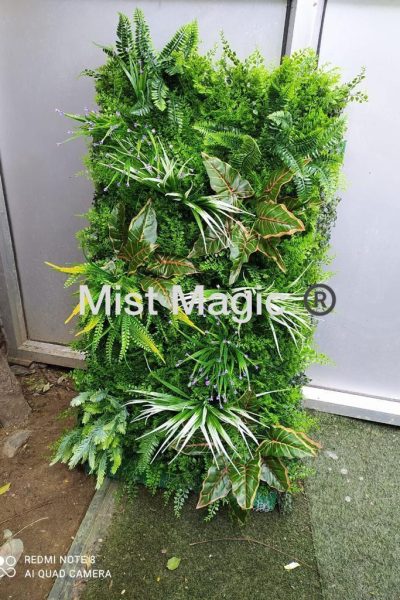
Artificial Vertical Garden
An artificial vertical garden is a captivating blend of nature and technology that elevate outdoor spaces. With their space optimization, vibrant greenery, low maintenance, versatility, and air purification benefits, these gardens bring a touch of natural beauty to any setting, making even limited spaces come alive with freshness and charm.
Key Features:
- Maintenance free
- Can be customised as per requirements
- Panels are 8 ft x 4 ft and can be customised as per requirements
- Available in a range of shades of green and other naturally complimenting colours
- Can be used in small balconies, restaurants, hotels or facades of large buildings to enhance look











Real Plants Vertical Gardens
Key Features:
- Can be customised
- General panels are 8 ft x 4 ft
- Can be used in small balconies or facades of large buildings
- Drip irrigation available for facades of high height
- All year green plants with minimal maintenance
- Oxygen omitting & pollution fighting
- Can be used in small balconies, restaurants, hotels or facades of large buildings to enhance look




FAQs
A: Vertical gardens can be simple to maintain if they are properly set up and cared for. Regular watering, pruning, and fertilizing are necessary for healthy growth, but the maintenance requirements depend on the plant species and the growing medium used.
A: Vertical gardening has several benefits, including maximizing the use of limited space, improving air quality, reducing energy consumption, and providing aesthetic appeal. It also offers a sustainable way to grow fresh produce in urban environments.
A: Vertical gardens can be used in a variety of settings, including residential, commercial, and public spaces. They are ideal for small balconies, rooftops, courtyards, and indoor spaces such as offices and lobbies.
A: A vertical garden requires a suitable growing medium, irrigation system, appropriate plant selection, adequate sunlight or grow lights, and regular maintenance. The growing medium may include soil, hydroponic systems, or other specialized materials. Proper irrigation is essential for plant health and may involve drip systems, misting, or hand watering.
